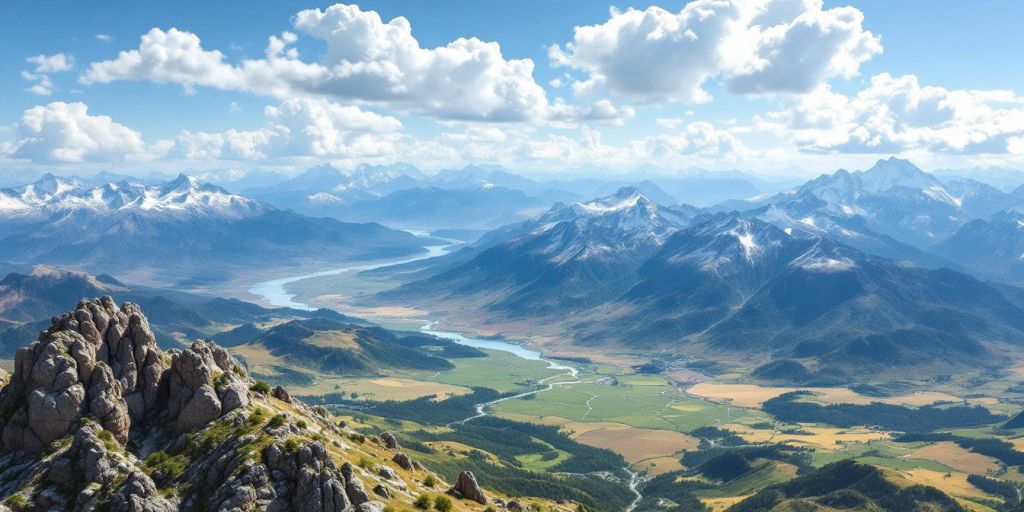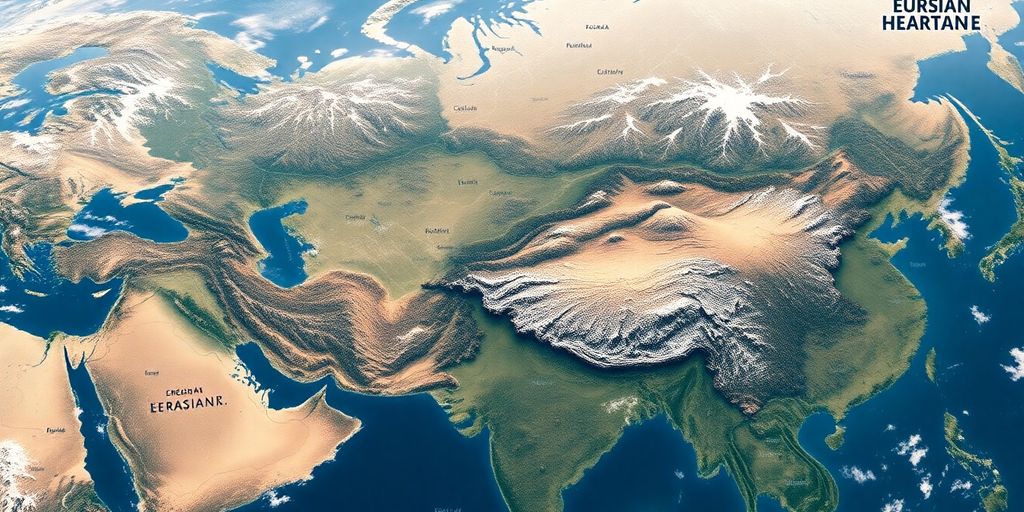In-Depth Book Review: Prisoners of Geography and Its Insights on Global Politics

In the captivating book “Prisoners of Geography,” author Tim Marshall explores how the physical features of countries shape their political decisions and international relationships. This book reveals the significant impact geography has on global politics, making it a must-read for anyone interested in understanding the intricate ties between land and power. Through insightful analysis and engaging storytelling, Marshall invites readers to consider how mountains, rivers, and borders influence the fate of nations. In this review, we will delve into the key themes and ideas presented in the book, highlighting its relevance in today’s world.
Key Takeaways
- Geography significantly influences a country’s political decisions and alliances.
- Historical events are often shaped by geographical features such as mountains and rivers.
- The book provides case studies that illustrate the impact of geography on global conflicts.
- Understanding geography can help predict future geopolitical trends and challenges.
- Tim Marshall’s writing makes complex ideas accessible to a wide range of readers.
Understanding the Premise of Prisoners of Geography

The Author’s Perspective
Tim Marshall, a seasoned journalist, presents a compelling view on how geography shapes global politics. He argues that the physical features of our world, like mountains and rivers, play a crucial role in determining the fate of nations. Marshall’s insights help readers understand that geography is not just about maps; it influences decisions made by leaders and the conflicts that arise between countries.
Core Themes Explored
In "Prisoners of Geography," several key themes emerge:
- Geographical Determinism: The idea that geography limits or shapes political choices.
- Historical Context: How past events are influenced by geographical factors.
- Cultural Impact: The way geography affects cultural identities and interactions.
Relevance to Modern Geopolitics
The book is highly relevant today as it sheds light on current global issues. Understanding geography helps explain:
- Territorial disputes: Why countries fight over land.
- Resource allocation: How natural resources influence power dynamics.
- Migration patterns: The movement of people due to geographical challenges.
The insights from Prisoners of Geography provide a new lens to view international relations, making it essential for anyone interested in global affairs.
Overall, Marshall’s work is a valuable resource for understanding the intricate relationship between geography and politics, making it a must-read for students and enthusiasts alike.
| Key Concepts | Description |
|---|---|
| Geographical Determinism | Geography limits political choices. |
| Historical Context | Past events shaped by geography. |
| Cultural Impact | Geography influences cultural identities. |
Analyzing the Impact of Geography on Global Politics

Historical Context and Its Influence
Geography has always played a crucial role in shaping global politics. The physical features of a region, such as mountains, rivers, and oceans, can either help or hinder the movement of people and goods. For example:
- Mountains can act as barriers, making it hard for armies to invade.
- Rivers often serve as trade routes, boosting economies.
- Oceans can protect nations from invasions, allowing them to develop independently.
Geographical Determinism in Political Decisions
The idea that geography influences political decisions is known as geographical determinism. This concept suggests that the location and physical characteristics of a country can dictate its political strategies. Some key points include:
- Countries with natural resources often have more power.
- Nations surrounded by hostile neighbors may prioritize defense.
- Access to trade routes can enhance a country’s economy.
Case Studies Highlighted in the Book
In "Prisoners of Geography," several case studies illustrate how geography shapes political outcomes. For instance:
- Russia struggles with its vast size and lack of natural borders, making it vulnerable to invasions.
- Afghanistan’s mountains have made it difficult for foreign powers to control the region, leading to ongoing conflicts.
- The Middle East faces competition over resources like oil, which often leads to conflicts between nations.
Understanding the impact of geography is essential for grasping the complexities of global politics. It reveals why some countries thrive while others face challenges.
In summary, geography is not just a backdrop; it is a key player in the game of global politics, influencing decisions and shaping the future of nations.
Regional Focus: How Geography Shapes Different Areas
The Geopolitical Landscape of Europe
Europe’s geography has played a significant role in shaping its political landscape. The region’s historical events, such as wars and colonialism, have led to lasting changes in borders and power relations. Key factors include:
- Proximity to other nations, which can lead to alliances or conflicts.
- Natural barriers like mountains and rivers that influence trade routes.
- Access to the sea, which affects economic opportunities.
Asia’s Geographical Challenges
Asia presents unique geographical challenges that impact its politics. The continent is characterized by:
- Vast mountain ranges that hinder movement and communication.
- Diverse climates that affect agricultural productivity.
- Resource distribution that leads to competition among nations.
Africa’s Unique Geopolitical Position
Africa’s geography offers both challenges and opportunities. The continent is rich in resources but faces:
- Political instability due to colonial legacies.
- Environmental challenges like desertification and climate change.
- Strategic importance in global trade routes, especially through the Suez Canal.
Understanding how geography influences political decisions is crucial for grasping the complexities of global relations. Geography is not just a backdrop; it actively shapes the destinies of nations.
Critical Reception and Public Perception
Reviews from Political Analysts
The book Prisoners of Geography has received a variety of opinions from political analysts. Many praise its insightful analysis of how geography influences global politics. Here are some key points from their reviews:
- The writing is described as clear and engaging.
- Analysts appreciate the in-depth exploration of geopolitical themes.
- Some critiques mention a need for more diverse perspectives on certain issues.
Reader Reactions and Interpretations
Readers have also shared their thoughts on the book, often highlighting its entertaining and informative nature. Here are some common reactions:
- Many find it a great read for understanding current events.
- Customers note that the book is well-written and easy to follow.
- Some readers express a desire for more case studies to illustrate points.
Comparisons with Other Geopolitical Works
When compared to other geopolitical books, Prisoners of Geography stands out for its unique approach. Here’s how it stacks up:
| Book Title | Strengths | Weaknesses |
|---|---|---|
| Prisoners of Geography | Insightful, easy to read | Limited case studies |
| The Power of Geography | Comprehensive, detailed analysis | Dense writing style |
| The New Map | Current events focus | Complex concepts |
Overall, Prisoners of Geography is seen as a valuable resource for anyone interested in understanding the role of geography in global politics.
This book is a must-read for those wanting to grasp how geography shapes political landscapes around the world.
The Book’s Contribution to Geopolitical Understanding
Educational Value for Students and Scholars
- Prisoners of Geography serves as a foundational text for understanding how geography influences global politics.
- It simplifies complex geopolitical concepts, making them accessible to students.
- The book encourages critical thinking about the relationship between geography and political decisions.
Influence on Policy Makers
- Policymakers can gain insights into how geographical factors affect international relations.
- The book highlights the importance of considering geographical constraints when making strategic decisions.
- It provides a framework for analyzing current geopolitical issues through a geographical lens.
Long-term Implications for Global Politics
- The insights from the book suggest that geography will continue to play a crucial role in shaping future conflicts and alliances.
- Understanding geographical influences can help predict shifts in global power dynamics.
- The book emphasizes that geographical factors are often overlooked in political discussions, which can lead to miscalculations.
The book’s key themes highlight how geography shapes borders, trade routes, and geopolitical conflicts, making it essential for anyone interested in global politics.
Author’s Background and Writing Style
Biography and Previous Works
Tim Marshall, the author of Prisoners of Geography, has a rich background in journalism. He served as the Diplomatic Editor and foreign correspondent for Sky News. With over thirty years of experience in news reporting, he transitioned from full-time journalism to focus on writing and analysis. His extensive career has provided him with a unique perspective on global events.
Narrative Techniques Used
Marshall’s writing style is often described as fluid and engaging. He uses a conversational tone that makes complex geopolitical concepts easier to understand. His ability to weave historical context with current events helps readers grasp the significance of geography in shaping political landscapes. Some key narrative techniques include:
- Storytelling: He often shares personal anecdotes from his experiences in various countries.
- Clear Explanations: Concepts are broken down into simple terms, making them accessible to a wide audience.
- Visual Aids: The use of maps and illustrations enhances understanding of geographical influences.
Impact of Author’s Experience on Content
Marshall’s experiences in conflict zones and diplomatic settings have greatly influenced his writing. He brings a wealth of knowledge and firsthand insights into the geopolitical dynamics of different regions. His background allows him to present a well-rounded view of how geography impacts global politics.
Marshall’s journey through various countries has not only shaped his understanding of geopolitics but also enriched his storytelling, making his work both informative and captivating.
Overall, Tim Marshall’s background and writing style contribute significantly to the depth and clarity of Prisoners of Geography, making it a valuable resource for anyone interested in understanding the interplay between geography and global politics.
Future Implications of the Book’s Insights
Predictions for Future Geopolitical Trends
Understanding geography can help us predict how countries will act in the future. Here are some key points to consider:
- Geographical advantages will continue to shape trade routes and economic power.
- Countries with strategic locations may become more influential in global politics.
- Environmental changes could lead to new conflicts over resources.
Potential Influence on International Relations
The insights from Prisoners of Geography can guide policymakers in several ways:
- Recognizing the importance of geography in security strategies.
- Anticipating conflicts based on geographical constraints.
- Understanding how natural resources impact international relations.
The Role of Geography in Emerging Conflicts
Geography will play a crucial role in future conflicts. Some examples include:
- The Arctic region, where melting ice is opening new shipping routes.
- The South China Sea, where territorial disputes are influenced by geography.
- The Middle East, where geographical factors continue to drive tensions.
The insights from Prisoners of Geography remind us that geography is not just a backdrop; it actively shapes the world we live in. Understanding these dynamics is essential for navigating future challenges.
Conclusion
In conclusion, "Prisoners of Geography" by Tim Marshall is a powerful book that shows how geography affects the politics of countries around the world. It explains that mountains, rivers, and other natural features can shape the decisions that leaders make and the relationships between nations. By looking at different regions, Marshall helps us understand why some countries struggle while others thrive. This book is not just for geography students; it’s for anyone who wants to grasp the bigger picture of global politics. It encourages readers to think critically about how geography influences current events and international relations. Overall, this book is a must-read for those interested in understanding the world we live in.
Frequently Asked Questions
What is the main idea of “Prisoners of Geography”?
The book explains how a country’s geography, like its mountains and rivers, affects its politics and decisions.
Who is the author of the book?
The author is Tim Marshall, a journalist with a deep understanding of global politics.
How does geography influence international relations?
Geography can create challenges or opportunities for countries, shaping their alliances and conflicts.
Are there any specific regions discussed in the book?
Yes, the book looks at regions like Europe, Asia, and Africa, showing how their geography affects their politics.
What do readers think about the book?
Many readers find it insightful and engaging, appreciating how it connects geography to current events.
Can this book help students learn about geopolitics?
Absolutely! It provides clear examples and explanations that make complex ideas easier to understand.








Responses